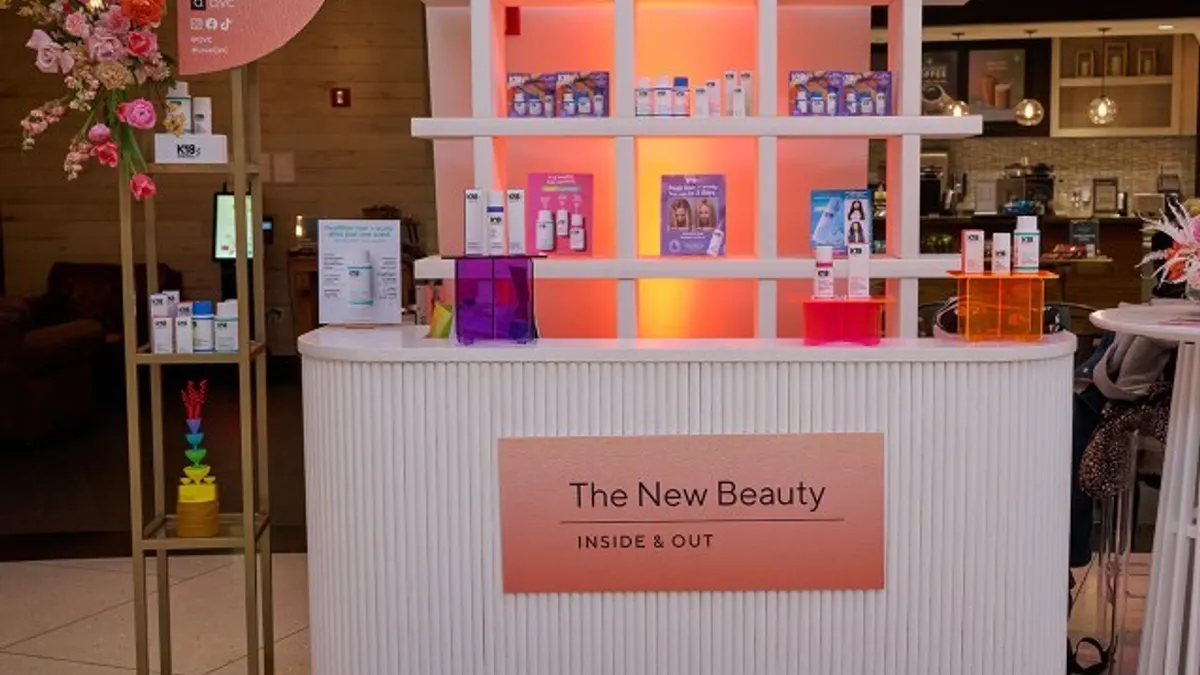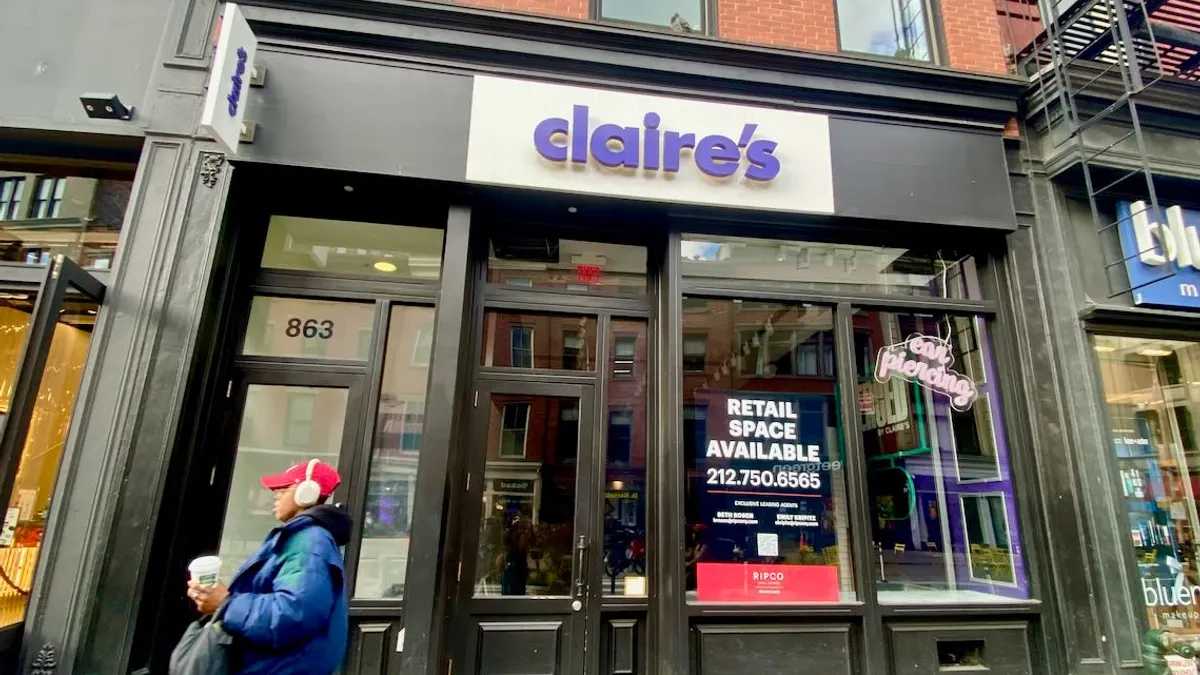Knix's swimwear launch wasn't supposed to go this way. The brand, which started out selling leakproof underwear, had grand plans for its entry into the category: a photoshoot with influencers in Tulum, Mexico, and the chance for one lucky winner to come with them.
The idea was to use Instagram Stories so customers could get a glimpse at the new products as the shoot was happening, and as a result, Knix was left with no assets — not even photography — when the growing coronavirus pandemic forced the brand to abandon its plans.
Knix canceled the villas and activities booked, and regrouped around a new idea, which included picking 25 customers to model the swimwear in the comfort of their own homes. That meant combing through about 11,000 submissions and communicating the go-forward strategy to everyone involved, including its community of followers and the thousands of candidates who had applied to go to Tulum.
The collection launched May 1, and has been the most successful sales launch in the brand's history, according to CEO and founder Joanna Griffiths.
"We were certainly not expecting that," Griffiths told Retail Dive. "I think we were all internally quite nervous about launching swimwear in the midst of what's going on."
The launch, though, isn't the only part of the business that has seen unprecedented success during the coronavirus outbreak. "We're seeing the strongest sales that we've ever seen across the board," Griffiths said during a conversation in mid-May, noting that sales were up 65% year over year in April, its highest sales month ever, and that May sales were on track for 110% growth over the prior year. Griffiths noted that it feels like the brand is revising forecasts and putting in orders for more products "every day."
The swimwear launch exceeded the DTC brand's expectations, but the company also got lucky to be operating in a space with many products that come in handy during a pandemic, including loungewear, intimates and sports bras. But that didn't stop the initial wave of fear.
"There were moments where, even the first few days, our sales got cut in half or 75% almost overnight," she said, adding that leadership began looking at tough questions. "Are we going to make it? How are we going to make it and what's that going to look like?"
Now, Knix has a good problem: working hard just to keep up with demand.
Knix isn't the only DTC brand that's made its way through the pandemic with far more success than failure. Bridal retailer Azazie briefly felt the burn of the pandemic when factories were shut down and its production suffered, but with the help of its factories outside of China, the company shifted gears. Aside from a temporarily longer production window, the brand has come out unscathed and is operating at full capacity without any delays, Chief Marketing Officer Ranu Coleman told Retail Dive in May.
The retailer even saw a boom in January and February, when sales numbers tripled from the year-ago period as customers bought everything in advance of the pandemic hitting the U.S. Traffic has continued to be high.
"We're actually seeing an influx of traffic to our site because so many customers can't shop at brick and mortar — maybe places where they were planning on making appointments or having bridal appointments," Coleman said. "Those are all not happening."
Part of it may be the luck of the draw, but these brands also took purposeful steps to stay connected to customers and avoid collapse during a pandemic that has hurt many more retailers than it's helped.
The importance of pivoting
Griffiths is no stranger to pivoting. When she first started Knix in 2013, it was a leakproof underwear brand. But soon after, she shifted the business into new categories, saying the market wasn't quite "ready" for the brand's flagship product. Griffiths also originally built Knix as a wholesale business and it was in close to 700 or 800 retail locations in North America before Griffiths pulled the trigger and made Knix a direct-to-consumer brand.
"In the fall of 2016, I pulled out of every single one of them to transition to be online only," she said. "I cut most of our revenue in the process, but it ended up being the right decision."
The coronavirus outbreak required smaller pivots, but Griffiths felt more prepared to make them thanks to the brand's history of adapting. At the beginning of the crisis, it meant sending employees to work from home almost immediately, as someone in the office was connected to a COVID-19 case. With the swimwear campaign, it meant more than just finding a new concept — logistics also had to be thought through, including how to select the customers that would star in the campaign, and how to make sure the brand got the assets it needed.
"We were looking for obviously diversity in terms of body type and ethnicity and age, but we also were looking for diversity in terms of the kinds of photos that we could get," Griffiths explained. "Could we find people in California to maybe take a picture at a pool? We had to engineer the shots that we wanted for that."
The company also built a guide for the participants with information on how to take a good picture at home, some ideas for props or locations, and other tips. While it wasn't the launch Knix had in mind, it resonated with the community, which Griffiths attributes to a couple of different factors.
For one thing, the community got behind the swimwear launch early, and Knix was careful to share details for its new plan in conjunction with its announcement that the Tulum trip was off. For another, the resulting campaign helped to battle the idea of the "perfect body" that can be attached to swimwear.
"I think it was really refreshing for our customers and our community to see: These are the bathing suits and this is what they look like on 25 everyday people from across the country," Griffiths said. "This is them feeling great, looking great in their backyard, by their pool, on their front doorstep, in their bathroom — all the places that we got images sent from, and that also really connected with people."
At Azazie, pivoting has come in the form of rethinking how to engage with customers, and shifting to make sure that more of the most sought-after merchandise is available. Azazie has no physical stores, so it's always had to contend with how to mimic some of the experience shoppers would get in stores, but now those virtual tools have become much more valuable.
"We've been trying to incentivize brides to do a zoom party and pop the champagne and try on your dresses — trying to figure out ways that they can still have that bridal experience online," Coleman said, noting that the brand has also seen an uptick in the number of customers using its virtual showroom feature.
That tool allows a customer to create a showroom and invite the bridal party, as well as any other friends or family they may want involved, to pick styles and colors, and chat about them in real time. The company is trying to be thoughtful about how to make the experience enjoyable when customers have to do it from home and can't do some of the activities they usually would, like going to a store with their mom to try on dresses.
Coleman also pointed to some merchandise learnings the company has taken away from the pandemic so far, namely that price has become more important to customers and some designs are rising in popularity over others.
"We're noticing that our styles, for example, that are much more simple are selling right now," Coleman said. "I think people are having a wedding still, but it's in their backyard, or it's very simple. They're eloping."
As simple as keeping in touch
Both brands have also kept up communication with customers during the length of the crisis, adjusting their strategies to fit the concerns that are top of mind right now. For Azazie, that meant a lot of transparency with customers about how long dresses would take to arrive and what kind of delays they could expect.
Regularly, Azazie's production window is six weeks, Coleman said, but during part of the pandemic, it grew to nine weeks. While the delay was certainly not as bad as it could have been, the company updated FAQs, had a notice on its website and also reached out to customers that had ordered to make sure they knew exactly what to expect under the different circumstances.
"This is not like you're buying a shoe, it's a really important purchase," Coleman said, noting customers tend to get especially worried about bridal gowns.
Because of all the fears floating around, Azazie has also been taking to Instagram Live to try and talk through issues that are coming up for its customers in the midst of weddings being put on hold or at the least undergoing significant changes.
"A lot of them have come to us asking: 'Should I postpone my wedding? Should I cancel my wedding?'" Coleman said of the brand's conversations with brides. "And obviously, we don't know what's the most appropriate, but we try to give some advice on that and just try to be a resource right now."
It's one way the brand can support customers navigating through uncertainty right now, and it's been top of mind for Knix as well. In addition to keeping in touch with its community about the upcoming swimwear launch, Knix also used social early on in the pandemic for what Griffiths called a "mental health check-in" with its customers.
"We hear about brides who have been laid off and their partner's been laid off and somebody in their family is sick. Even if we can alleviate one financial burden of a dress, then we try to do something."

Ranu Coleman
Chief Marketing Officer at Azazie
The brand essentially just asked customers how they were doing, and followers could respond to the post with different colored hearts to communicate what type of mood they were in. Anyone that said they weren't doing so great or needed somebody to talk to was reached out to by the social team and given some resources of other people they might want to chat with as well.
That helped set the tone for how Knix was responding to the pandemic, Griffiths said, and the brand has also tried to include customers in its charity efforts, asking them to submit a form for a hospital or homeless shelter that they want Knix to donate PPE to. Griffiths said those donations have been weekly from Knix.
Azazie, too, has turned to donations — of masks, and also of bridal gowns. Dress donations started in April, but Coleman said in May they decided to extend it, donating 30 bridal gowns to brides who have been impacted in some way by the pandemic.
"It's different for everyone," Coleman said. "But we hear about brides who have been laid off and their partner's been laid off and somebody in their family is sick. Even if we can alleviate one financial burden of a dress, then we try to do something."
In addition to changing the short-term efforts of these brands, the pandemic has also, to an extent, altered how they think about their long-term plans. Azazie originally had plans to launch special occasion wear, but because of the pandemic, the company instead on May 8 debuted a ready-to-wear "casual fast-fashion brand," dubbed Blush Mark. The brand advertises itself as the place to find the "perfect looks for a night out, casual wardrobe basics, loungewear, and accessories."
The shift in Azazie's next product category is a microcosm of something that's happened more broadly across retail as businesses react to the specific customer needs of the pandemic. For many, it's taken the form of speeding up the rollout of services like buy online, pick up in-store or curbside pickup, and even delaying store expansion plans at established retailers like Ulta.
"We can't really go and sign a lease until we know what the world's gonna look like."

Joanna Griffiths
CEO and founder of Knix
Direct-to-consumer brands are fortunate in that many of them don't have a large fleet of brick-and-mortar stores to worry over during this time period. Knix only has two physical locations, which account for just 10% of its overall revenue, so the closures were not terribly impactful for the brand's business. However, the company was planning to open five stores pre-pandemic and just hadn't signed the leases yet, something Griffiths called a "blessing in disguise."
Those store openings are still on the radar, but they've been pushed back for the time being. Griffiths said the company will start looking again in the fall, but it could be even longer before the brand resumes its physical expansion plans.
"It's delayed now because we can't really go and sign a lease until we know what the world's gonna look like," Griffiths said.
Indeed, that may be the biggest takeaway of the pandemic. For the foreseeable future, retailers are operating in a world that is not the same as the one they're used to. What the customer wants could change multiple times over, and fortunes could turn on a dime once again if stores are forced to shutter for a second wave of the outbreak.
"When I think about the future, I think I'm optimistic about what it means for Knix, but I'm also aware that it's not going to be this super clear path," Griffiths said, noting the brand will have to be ready to adapt again moving forward. "In February, I was like, 'OK, this is our path to scale. This year, we're going to open this many stores and next year, we're going to open this many stores, and each store is going to do X million in revenue and that's how we're going to grow. I still think we're going to grow to the same extent. It's just not as cut and dry as it was before."























